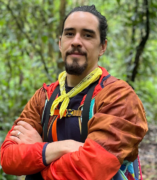
Ignacio Escalante Meza
Assistant Professor
Biological Sciences
Contact
Building & Room:
SES 3364
Email:
Related Sites:
About
Exploring the mechanisms of animal behavior is crucial to understanding their ecological and evolutionary consequences. Additionally, focusing on how and why animals do what they do allows us to further comprehend and predict their responses in the context of changing environmental and evolutionary pressures.
My research program focuses on the mechanisms of animal behavior through the lenses of ecology and evolution. Specifically, I study arachnids and insects in tropical forests in Costa Rica, meadows and wetlands in Wisconsin, and urban landscapes in Chicago. The main topics of my research include: (1) decision-making in navigation, defense, and reproduction; (2) the evolution of shared and divergent communication mechanisms; and (3) how biomechanical and physiological mechanisms shape behavior.
I integrate tools of behavioral ecology, biomechanics, bioacoustics, and physiology to study, for example, the consequences of leg loss on locomotion, habitat use, and reproduction in harvestmen/daddy long-legs, the importance of vibratory communication in sexual selection and speciation in treehoppers, and the role of chemical communication in multi-specific aggregations in Neotropical arachnids.
Selected Publications
Escalante I, M Domínguez, D Gómez-Ruiz, and G Machado. 2022. Benefits and costs of multi-specific aggregations in harvestmen (Arachnida: Opiliones). Frontiers in Ecology and Evolution 9:766323.
Escalante I, and DO Elias. 2021. The type of leg lost affects habitat use but not survival in a non-regenerating arthropod. Ecology and Evolution 11(15): 10672-10685.
Escalante I, VR Ellis, and DO Elias. 2021. Leg loss decreases endurance and increases oxygen consumption during locomotion in harvestmen. Journal of Comparative Physiology A 207:257-268.
Escalante I, MA Badger, and DO Elias. 2020. Rapid recovery of locomotor performance after leg loss. Scientific Reports 10: 13747
Escalante I. 2015. Predatory behaviour is plastic according to prey difficulty in naïve spiderlings. Journal of Insect Behavior 28: 635-650
Escalante I. 2013. Ontogenetic and sexual differences in exploration and web construction in the spider Physocyclus globosus (Pholcidae). Arachnology 16: 61-67
Education
B.S. in Biology, Universidad de Costa Rica. 2009.
M.Sc. in Biology, Universidad de Costa Rica. 2013.
Ph.D. in Environmental Science, Policy, and Management, University of California – Berkeley. 2020.
Postdoctoral research associate. Department of Biological Sciences, University of Wisconsin – Milwaukee. 2020-2022.